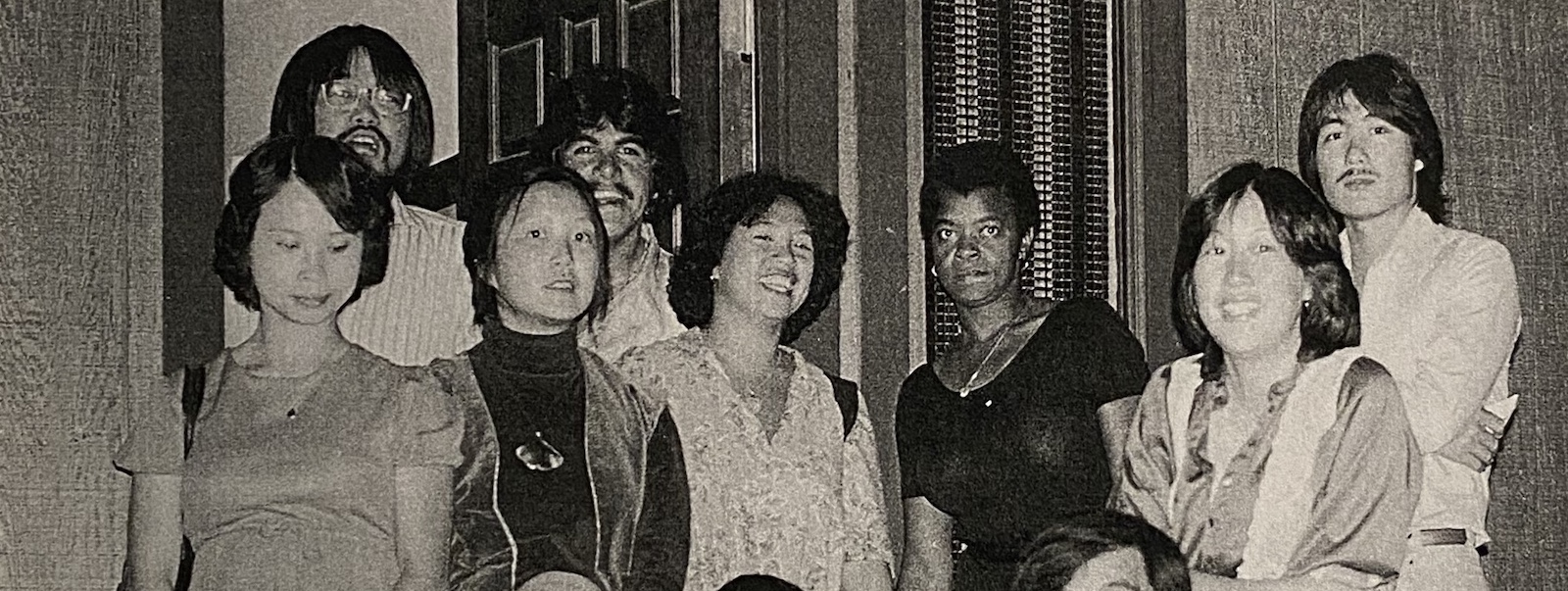2012-2017: Black Lives Matter, Trump, Islamophobia

Students pull up their hoodies to observe a moment of silence at Trayvon Martin's memorial. (La Voz, 2012)
Overview
During this period, APALI was a powerhouse on campus and in the community, holding two of its four core programs—the Summer Youth Leadership Academy and Leadership Training Internship—at De Anza. One of its most prominent alumni, Evan Low, led De Anza faculty and students to march on the State Capitol and petition for reforms of Proposition 13 in order to improve funding for schools. Despite becoming a gathering space for various student groups on campus, from AAPI to LGBT groups to screenings of presidential debates, the MCC ran into funding issues. Meanwhile, the Black Lives Matter (BLM) movement sparked discussions of racial justice and the widening income gap, and the Trump travel ban led to faculty and administration voicing their support for Muslim students on campus.
I wanted to highlight the sense of our campus community rallying together. Whether it was racialized violence, political elections, the state budget, community leadership, mass incarceration, or Islamophobia—our students, faculty, and staff were on it. Making connections between history and now, and across different communities, our campus was politically active.
Key Events
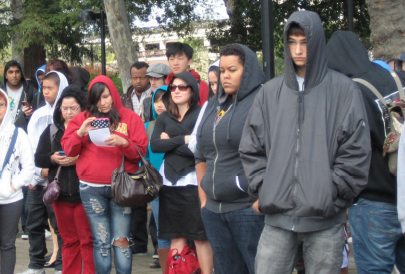
Trayvon Martin memorial. (La Voz, 2012)
April 12, 2012
Trayvon Martin memorial
De Anza holds a memorial at the Freedom Stage for Trayvon Martin, a Black teen who was shot and killed in February.
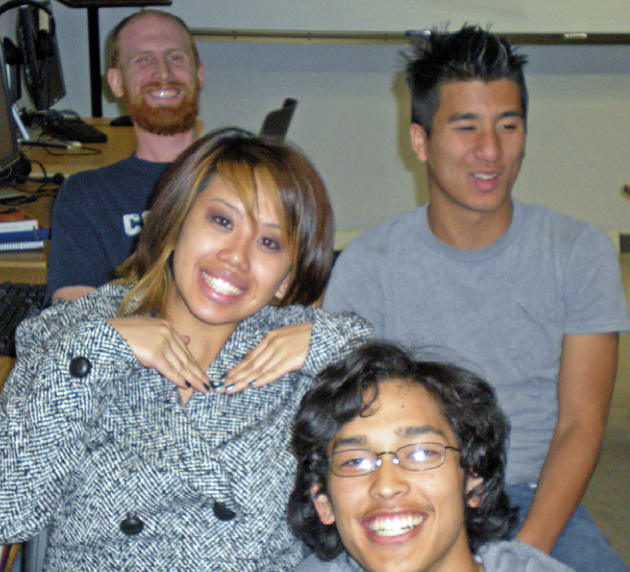
IMPACT AAPI students pose for the camera (IMPACT newsletter, 2009)
Summer 2012
De Anza President addresses the "model minority" myth at national conference
President Brian Murphy speaks at the annual Asian & Pacific Islander American Scholarship Fund Higher Education Summit in Washington DC. In his speech, Murphy states that De Anza's new AANAPISI designation means it must be deliberate about serving Asian American and Pacific Islanders in a way that engages them in their communities along with other student groups.
The "model minority" myth is a narrative that became prevalent in popular media in the 1960s that disassociates Asian Americans from a tradition of radical activist politics and political solidarity with other people of color. Instead, the myth celebrates Asian Americans as a minority group for following the rules of assimilation and achieving traditional indicators of educational and economic success.
However, as Dr. Robert Teranishi pointed out at the conference, this myth not only pits Asian Americans against other marginalized groups but also overlooks the vast disparities within the Asian American population. Many subgroups have not achieved the success often attributed to Asian Americans, with some even experiencing declining educational attainment across generations. This, Teranishi argues, highlights a lack of institutional support and awareness.
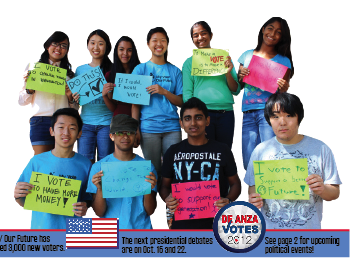
Volunteers urge young people to vote. (La Voz, 2013)
Fall 2012
"Political apathy goes out of style"
Students hold weekly discussions about the ongoing presidential debates in the Multicultural Center which are moderated by Ethnic Studies faculty memberJulie Lewis.
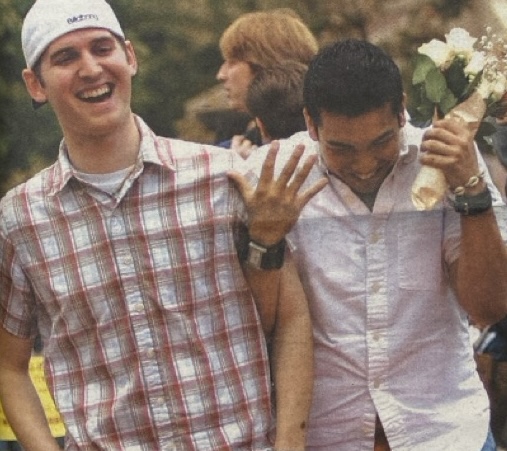
Members of De Anza Pride Club participate in a "mock marriage" fundraising event. (La Voz, 2004)
June 2013
MCC events
June events at the Multicultural Center include a "Men Addressing Violence Summit" hosted by students from ICS/POLI 33 and a "LGBTQ in the Media" event hosted by LGBT Studies and the Rainbow Club.

De Anza APALI/ASAM graduate Evan Low in office as a CA State Assemblymember (Wikipedia, 2016)
October 2013
"De Anza starts weekly public policy seminars"
Evan Low, Paul Fong, and others speak at a seminar on campus about the importance of public involvement in policy. Both graduates of Asian American Studies at De Anza, Fong was elected to the California State Assembly in 2008, and Low in 2014.
Low was also a graduate of APALI's Youth Leadership Academy at De Anza and attributed that experience to his interest in politics: "The APALI program really helped build my sense of identity and gave me a sense of purpose in terms of my commitment to service, who I am, and my role in society."
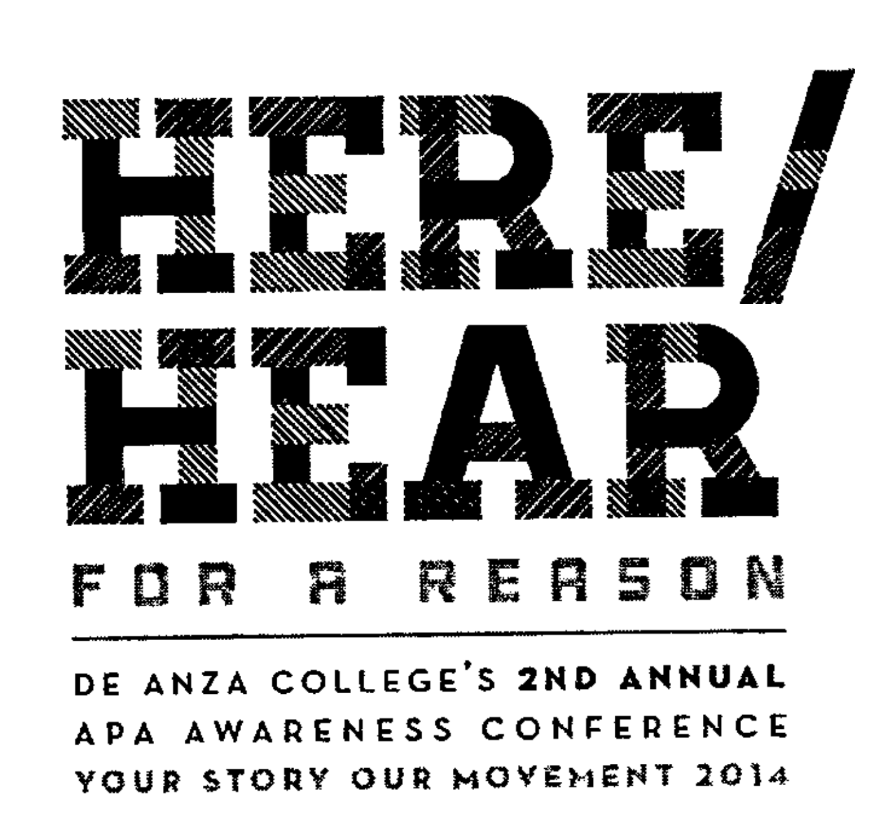
YSOM Conference Program (2014)
May 31, 2014
"Here/Hear for a Reason": De Anza's 2nd APA Conference
De Anza holds its second Your Story, Our Movement (YSOM) Asian American Pacific Islander (AAPI) Awareness Conference on campus, reported in La Voz's "Campus Events" section. The first conference was held in 2013, the first AAPI conference to be held in over a decade. This year's event, named "Here/Hear for a Reason," is organized by students and includes a keynote speech by performance artist Kristina Wong, collaborative workshops, and a concert.
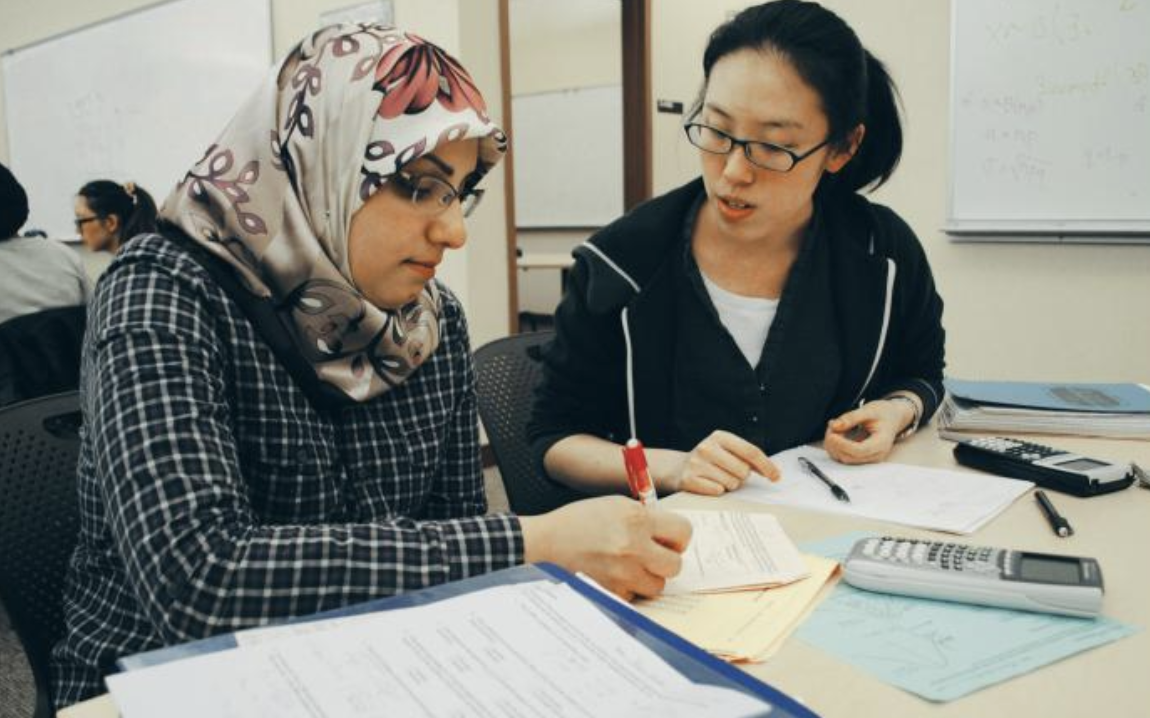
A tutor works with a student. (La Voz, 2013)
February 18, 2015
DASB rejects MCC funding request
The DASB (De Anza Associated Student Body) Senate rejects two-thirds of the Multicultural Center's funding request, which would have provided a secretary position.
I thought this was weird considering MCC hosted so many important events. And yet it was on the budget chopping block time and again. I hope Our Narrative contributes to more people knowing the value of the MCC.

Protestors gather in front of the California State Capitol. (La Voz, 2015)
March 2015
"March in March rally: De Anza students, faculty travel to Capitol"
On March 2, students from several colleges gather in front of the California State Capitol in Sacramento to petition for Proposition 13 reforms during March in March.
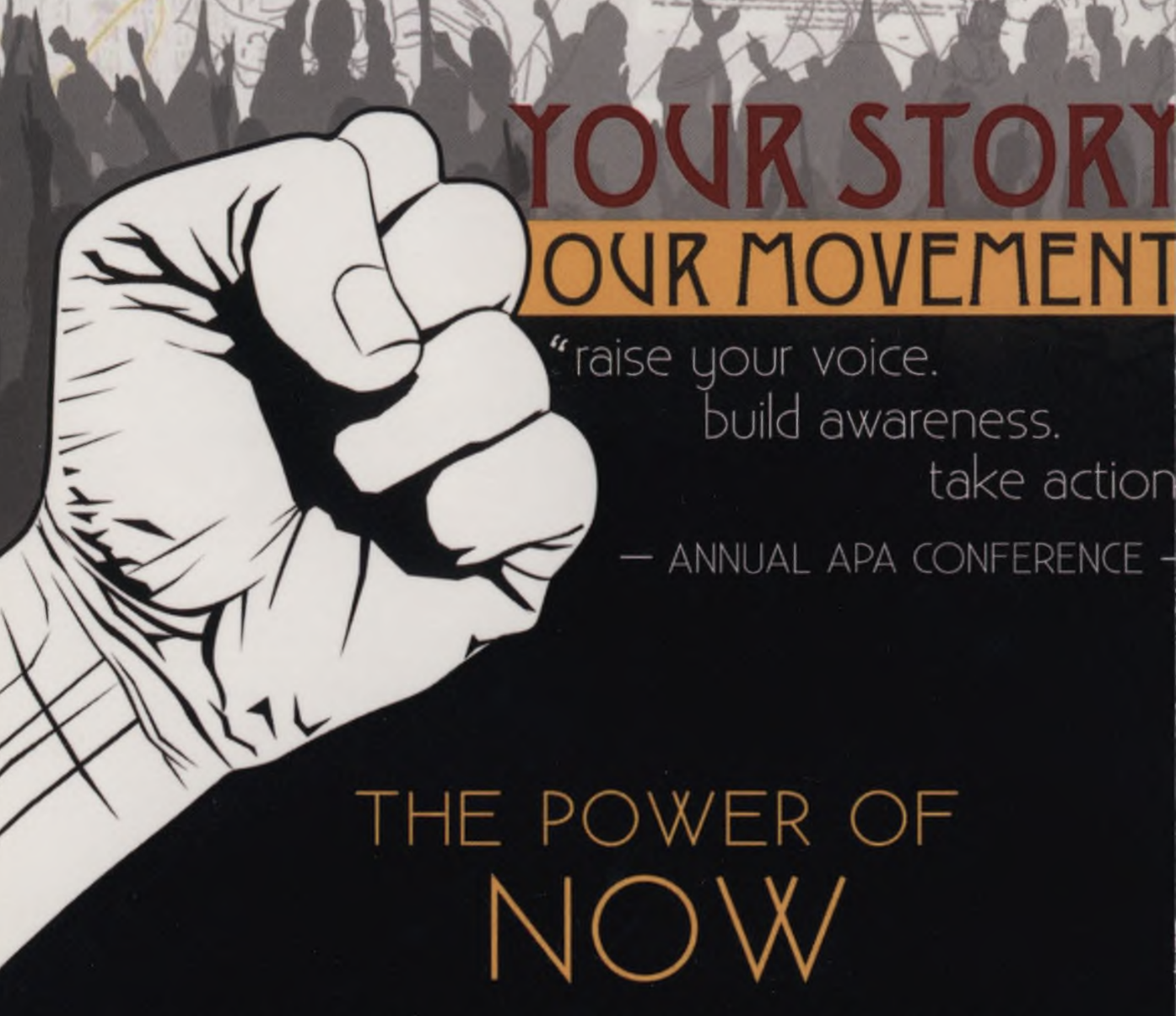
YSOM Conference Program (2015)
May 30, 2015
"The Power of Now": De Anza's 3rd AAPI Conference
De Anza holds its third YSOM AAPI Awareness Conference. This year's conference is called "The Power of Now."
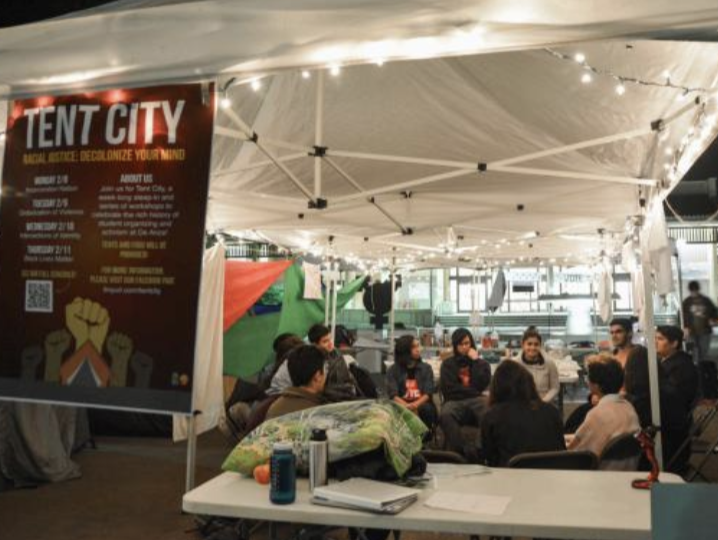
Students have a group discussion beneath a canopy at Tent City. (La Voz, 2016)
February 2016
Tent City promotes theme of racial justice
Tent City began as an advocacy event in 2003, spearheaded by student groups including Students for Justice (SFJ) and APASL to prevent staff layoffs, and continued since as an annual form of on-campus, non-violent protest. For this year's iteration, students gather at Tent City in the Main Quad at De Anza College to discuss social issues such as incarceration, globalization, intersectionality of identity, and Black Lives Matter.
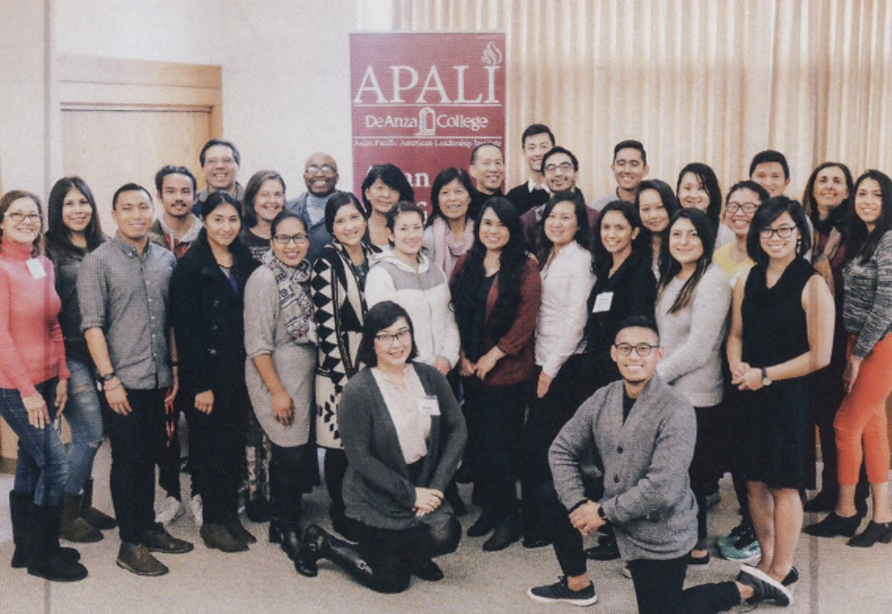
APALI members circa 2017 (APALI website)
2017
APALI becomes a nonprofit
As APALI enters its third decade, it officially incorporates as a 501(c)(3) tax-exempt nonprofit, marking its transition from a De Anza College program to an independent institutional entity.
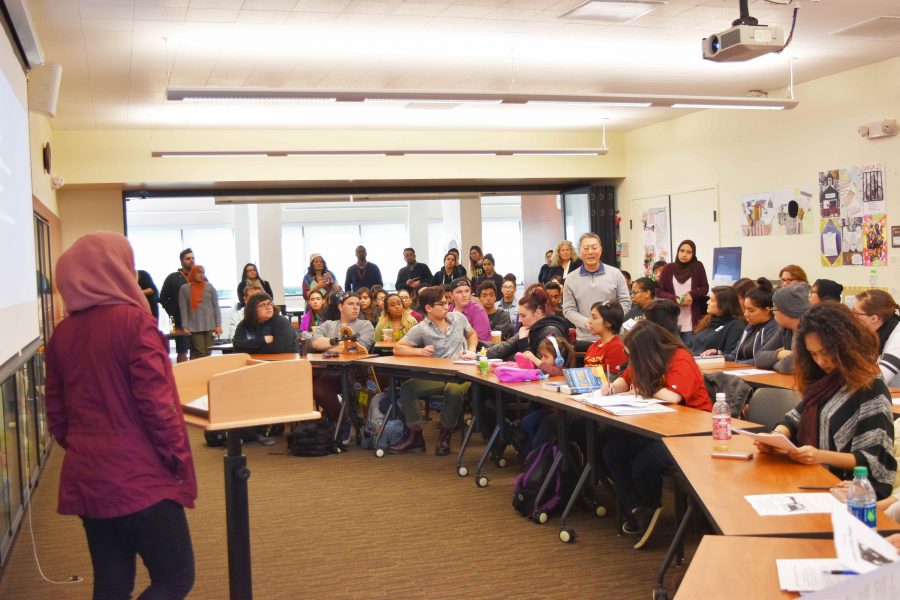
Students, faculty, and administration at the Muslim Student Association's Jan. 30 meeting in the MCC. (La Voz, 2017)
February 2017
De Anza stands in solidarity
70 students, faculty, administration and leaders of social justice groups showed support by presenting themselves as resources during the Muslim Student Association meeting detailing President Donald Trump’s executive order.
Takeaways
I'm struck by the level of political consciousness-raising and student organizing during this period.
In addition, educational leaders including De Anza's President, Brian Murphy, stepped up to challenge the "model minority" myth that had long been used to divide Asian Americans from other marginalized groups.
What stands out most to me is how De Anza students themselves were leading the charge. Asian American, Black, Latinx, Native American, and other student groups were uniting around shared struggles such as Black Lives Matter, labor activism, and the fight against racism targeting Muslims. Moreover, leaders emerging from programs like APALI spearheaded education reforms aimed not just at improving De Anza, but public schools across California.

